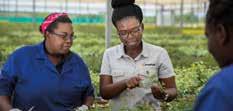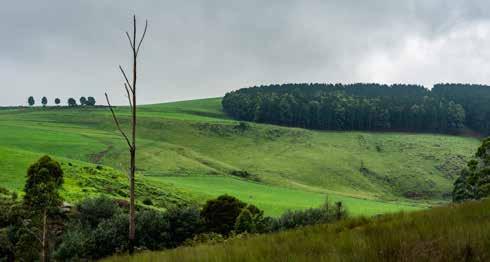
16 minute read
Forestry and paper
Diversification is a growing trend.
Big forestry and paper companies have been preparing themselves for change for many years now. The computer age and digitalisation presented complicated challenges to paper manufacturers and companies. In response, Sappi and Mondi, global leaders in paper and packaging with strong roots in KwaZulu-Natal, have embraced diversification.
Advertisement
Sappi has a strong emphasis on dissolving wood pulp and Mondi reports growing demand in its packaging divisions. Although Mondi closed one machine at its Durban plant in 2018, it will continue to make uncoated fine paper for the domestic market at the plant. Recent upgrades to Mondi’s woodyard at Richards Bay have made a big impact on efficiencies. The addition of an unbleached kraftliner product has expanded the company’s range. Three investments in eastern Europe will see the company’s saleable pulp and paper production go up by about 9% overall.
Sappi makes paper at two mills in South Africa: the mill at Tugela makes 185 000 tons of speciality paper per annum. A big focus for the company is dissolving wood pulp, made at one site in America and two in South Africa.
Dissolving wood pulp is sold as a raw material to converters around the world who produce from it a range of products such as textiles, cellophane wrap and pharmaceuticals.
SECTOR INSIGHT
TWK is the latest agricultural company to list on a stock exchange.
The giant Sappi Saiccor mill 50km south of Durban is the world's big gest manufacturer of dissolving wood pulp. The mill's capacity is 800 000 tons, which makes it the biggest of its kind in the world. Sappi is actively looking into the new fields of bio-materials and bio-energy.
Both company’s investments in the province are outlined in a special feature elsewhere in this publication.
National production figures in the forestry sector declined
manufacturing, auto identifi cation, bar coding and labelling sectors. As such, we are proud to be the sole distributor in Southern Africa for many of the leading internationally-renowned brands in those sectors in which we operate, such as HP Indigo, FOCUS Kemtek pursues Komori, Flint, Fujifi lm, Argox, CipherLab, Datalogic and Brother. And, with a focus always on providing highly skilled services and post-sales support, we’re ensuring our customers are maximising their potential for growth and profi t - day in, day out!
continual growth
Kemtek keeps abreast of industry developments and potential new markets while offering the best solutions to customers.
NATIONAL: 0861 KEMTEK • JHB: +27 (0)11 624 8000 • PTA: +27 (0)12 804 1410 • DBN: +27 (0)31 700 9363 • CPT: +27 (0)21 521 9600 • PE: +27 (0)41 364 3690 WWW.KEMTEK.CO.ZA
J25589_Kemtek_Propak_Advert_FA.indd 1
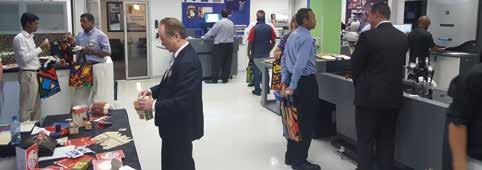
2019/02/14 16:12
Targeted industry events and product demonstrations are proving highly popular with Kemtek customers and prospective customers alike.
Long-established in the lithographic, flexographic, digital and large-format printing and packaging arenas, Kemtek has evolved over time into a multi-pronged organisation, entrusted with channel responsibility by many of the world’s leading brands in the barcoding and labelling sectors through widespread professional resellers, plus 3D printing, through its joint venture partner Rapid 3D.
Aligning with internationally-acclaimed brands is one aspect of Kemtek's continued success, coupled with expert sales and service support, and an agile and specialised national distribution network, annually achieving some 15 000 deliveries.
This fast-growing enterprise also represents specialist additive manufacturing equipment and materials providers in multiple sectors including aerospace, automotive, manufacturing, medical, dental and jewellery, with brands such as EOS, Envisiontec, MCor and Zortrax.
Building on core strengths Creating value on a sustainable basis is Kemtek’s marketing approach that's based on a detailed understanding of markets and the needs of the end user. These needs are then married to the technologies provided by Kemtek's principal brands. Providing a winning edge for all Kemtek's customers means delivering the most advanced technological equipment and service, backed by a total commitment to service excellence.
With digital printing firmly growing in Southern Africa, Kemtek and partner, HP Indigo, have recently expanded their labels and packaging portfolio with technology solutions to drive printing and converting toward more flexible, productive and profitable digital printing.
Taking digital finishing to the next level is the ability to integrate the Indigo 6900 with an HP Indigo GEM digital embellishment unit – a onepass label printing and embellishment system for spot, tactile, foil, holograms, mini textures and lamination.
In the packaging sector, Kemtek’s alliance with Flint Flexographic products goes from strength to strength. Flint has extended the range with nyloflex FTF-UV plates, designed for high-resistance to UVbased inks, and nyloflex FTP for paper packaging applications such as multiwall sacks and liquid dairy cartons. Another important development between Kemtek and Flint Group is a distribution agreement that allows Kemtek to supply the full range of ThermoflexX laser imaging systems in South Africa.
For more information, visit www.kemtek.co.za.
in 2017 for the third year in a row. Forestry SA reports that tonnage sales were nearly 2% down on the previous year, at 15-million tons. Wattle showed the largest decrease while pulpwood was the only category to increase, but by less than 2%. The National Department of Agriculture, Forestry and Fisheries reports that South Africa has a shortage of sawn timber and anticipates further shortages in the future.
Despite this overall trend in the national forestry picture, TWK has announced that it wants to buy 11 000 hectares of forest land to support its wood chip sales (especially to China and Japan) and timber exports. TWK is an agricultural company that grew out of the Transvaal Wattlegrowers Cooperative and which became the latest such company to be listed when it joined the ZAR X in 2017.
The KwaZulu-Natal provincial government's strategy of creating Industrial Economic Hubs (IEHs) includes the development and expansion of wood processing in the Harry Gwala District Municipality. This is in the wooded south-western part of the province and includes the towns of Kokstad, Harding, Ixopo and Underberg.
Nampak produces crêpe paper at Verulam and Rafalo produces tissue paper. SA Paper Mills is another paper producer.
Mpact's upgrade of its Felixton mill has increased capacity and improved efficiency. The project cost R765-million and takes overall production up to 215 000 tons and a lightweight containerboard option has been included in the product lines. This is in response to market demand for lighter packaging.
Mpact has plastics and paper operations, with the paper section divided into three divisions: paper manufacturing, corrugated and converted paper products and recycling.
The Merensky Group operates one softwood sawmill and a panel-processing plant in Kokstad that is geared to manufacture according to customers’ needs in any sector. Export is done through the Port of Durban.
NCT Forestry Co-op Limited is a key timber-marketing entity with more than 2 000 members and three wood-chipping mills.
ONLINE RESOURCES
Forestry South Africa: www.forestry.co.za KwaZulu-Natal Department of Agriculture and Rural Development: www.kzndard.gov.za South African Institute of Forestry: www.saif.org.za Technical Association of the Pulp and Paper Industry of South Africa: www.tappsa.co.za
R&B Timber Group has three pole treatment plants and is headquartered in Harding. Flaxton Timbers operates out of Ixopo and Natal Forest Products is in Richmond.
Timber
Timber plantations are found in five parts of the province: northern KwaZuluNatal, Midlands, southern KwaZulu-Natal, Zululand and Maputaland. Close to half-amillion hectares – 38.5% of the land in South Africa devoted to forestry – is allocated to timber plantations. Of this area, 70% is devoted to hardwoods and the balance to pine, the only softwood grown in large quantities in South Africa.
The percentage of privately owned forest land is 93.4%. Merensky has plantations in the Dargle forest while Sappi and Mondi have holdings across the province, and in other parts of South Africa.
Management of the 251 000 hectares of the plantation forest that Mondi has under management is done in line with sustainable forest man agement principles and the company is engaged in a part nership with the WWF to get different types of water users to work together in improving how water is used. Mondi has reduced its own consumption of fresh water by 12% in com parison to its use in 2015.
Sustainable growth
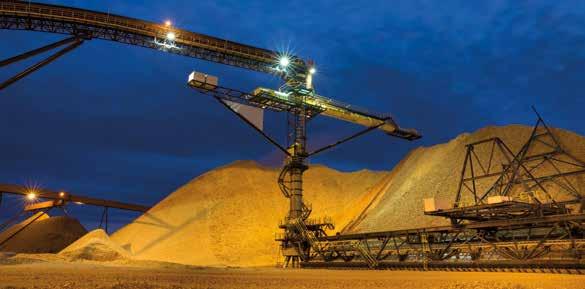
Mondi is a global leader with a culture that delivers sustainable growth.
Mondi is a global leader in packaging and paper, delighting its customers and consumers with innovative and sustainable packaging and paper solutions.
Mondi is fully integrated across the packaging and paper value chain – from managing forests and producing pulp, paper and plastic films, to developing and manufacturing effective industrial and consumer packaging solutions. Sustainability is embedded in everything Mondi does.
In 2018, Mondi had revenues of €7.48-billion and underlying EBITDA of €1.76-billion.
Mondi globally is leading the response of the packaging and paper industry in developing sustainable solutions to address key environmental and social challenges. The group is taking a sciencebased approach and working with partners across the value chain to develop innovative sustainable solutions that are fit for a circular economy. By taking a holistic view, Mondi believes it can meet the needs of each customer, their products and the planet to contribute to a better world.
Peter Oswald, Mondi Group CEO, commented: “As a global packaging and paper group, it is essential for our business, as well as the planet, to drive innovation and change throughout the value chain. We don’t see sustainability as a trend, it’s a requirement. Mondi’s unique offering of highperformance paper, plastic and hybrid solutions means that we can find the most sustainable fit for each application.”
Mondi South Africa
Our South African business sustainably manages some 250 000 hectares of plantation forests and manufactures and sells pulp, virgin containerboard and uncoated fine paper products. We have around 1 500 employees working in our forestry operations and two mills located in Richards Bay and Merebank, Durban.
Strategic advantages
Our focus is on leveraging our strong domestic market position and the global competitiveness of our Richards Bay mill. With a history spanning more than 50 years, we understand the value of being efficient, cost-competitive and customer-focused.
Our passion for performance will always be central to the way we run our business and is demonstrated through a continuous focus on quality, productivity and efficiency. The fundamental principle behind operational excellence at Mondi is the desire to do more with less.
We invest in and manage our business to ensure that our manufacturing operations maintain their cost advantage, that our forestry operations are managed sustainably for a secure timber supply, that we support our customers' success and invest in the development of our people and communities.
FOCUS Developing innovative solutions for a circular economy
Mondi is committed to best practice in forestry management and production.
Mondi South Africa is at the forefront of sustainable business practices. “It’s exciting to be playing a lead role in Mondi’s sustainability story. There are so many areas we are proud of but three stand out for me. From the work we are doing to reduce our water impact, to managing water catchment areas and wetlands through our work with partners, to using significantly less water in our operations. Second is the progress we have made in becoming a diverse and inclusive workplace, where people can grow to their full potential and contribute to our success. And then of course our globally competitive opera tions that produce high-quality, fully-recyclable products from sustainably sourced fibre,” explains Viv McMenamin, CEO Mondi South Africa.
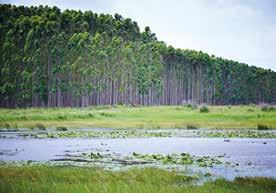
Sustainable fibre
The sustainable management of our forestry operations is key in managing our overall environmental impact, helping to protect ecosystems, and developing resilient landscapes.
Wood is one of the primary raw materials and our staff work hard to provide the best assurance for our stakeholders that the wood and fibre we use comes from responsible sources.
Plantation forests in South Africa are managed in a way that secures their longterm biological integrity, social value and productivity.
Maintaining FSC™ certification of forests is also an important part of our management approach. It assures compliance with globally recognised standards for sustainable forest management.
Water as a constrained resource
Given the critical importance of water to business, to local communities and to other stakeholders, we strive to manage water use wisely and efficiently – especially in water-stressed regions. We are committed to reducing the specific contact water consumption of our pulp and paper mills by 5% by 2020, against a 2015 baseline.
Drought conditions in South Africa remain a concern and we continue to look for opportunities to improve water security in the areas where we operate. The focus is on reducing water consumption, in particular at the Richards Bay mill.
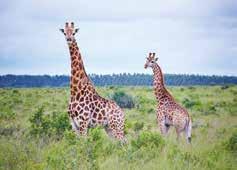
WWF-Mondi Water Stewardship Programme
Mondi promotes a landscape approach to freshwater stewardship. The focus of the long-standing WWFMondi Water Stewardship Programme (previously the WWF-Mondi Wetlands Programme) has grown from managing and rehabilitating wetlands with different groups of land-users (including Mondi) to catalysing water stewardship at the landscape scale, including ensuring collaboration and action by different land-users in the uMngeni and Mvoti River catchments, both of which are strategically impor tant water-supply areas for KZN’s economic hubs.
In 2014, following many years of collaboration, Mondi Group and WWF launched a global partnership to promote responsible forestry and a sustainable pulp and packaging sector.
In 2017, this global partnership was extended for another three years and the WWF-Mondi Wetlands Programme was renamed the WWF-Mondi Water Stewardship Partnership, reflecting its broadening focus on catchment-based water stewardship. Water stewardship assessments were conducted for the Richards Bay mill and plantations in South Africa. This was measured against the international Alliance for Water Stewardship Standard, a globally-applicable framework for major water users to understand their water use and impacts. The outcomes are now being used to investigate meaningful, cost-effective improvements to management systems to meet the core requirements and to advance some of the requirements.
In 2018, Mondi joined the WWF Climate Saver's Programme, WWF's global platform to engage businesses and industries on climate and energy.
Biodiversity and ecosystems
Responsible forest management involves increasing the long-term productivity and preserving ecosystem values in rural landscapes and protecting high conservation value areas such as wetlands.
Degradation of ecosystems and loss of habitats and species has a significant negative effect on the ecosystems that both communities and business rely on. We are committed to protecting biodiversity and ecosystem services in our forestry operations.
Maintaining an effective network of highconservation value areas and valuable habitats, and on imitating natural dynamics for key types of ecosystems where possible, is another focus.
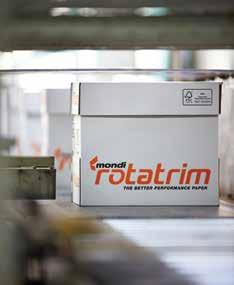
Eco-efficient products
The investment to expand our product range by producing unbleached kraftliner in addition to white-top kraftliner at the Richards Bay mill has been welcomed by customers. Baywhite, Baycel and Baykraft products are certified for food packaging (ISEGA) and Mondi has adopted Good Manufacturing Practice (externally certified).
FOCUS Inspiring Mondi people for long-term success
Leading the way in transformation and enterprise development.
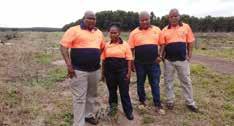
Mondi Zimele, established in 2007, is our small business development organisation. Its initial focus was on accelerating black economic empowerment in the forestry value chain. In 2012 the focus expanded to incorporate support for communitybased small businesses around Mondi’s operations. This was enabled through the establishment of the Mondi Zimele Jobs Fund, an enterprise development initiative co-funded by the Jobs Fund.
Since 2012, Mondi Zimele has provided approximately R100-million in loan funding to assist over 200 local businesses in the creation of more than 2 800 jobs. Mondi Zimele has also been instrumental in the establishment of several land claimant community contractors where we continue to emphasise productivity improvement, business administration and compliance as the key to success for these SMEs.
The Mondi Zimele and Department of Trade and Industry (dti) Forestry Contractor Incubator Programme
Mondi’s significant activities in a number of key areas reflect a strong commitment to transformation and B-BBEE. This is confirmed by Mondi’s Level One contributor status under the under the Forestry Sector Broad Based Economic Empowerment codes, as verified by an independent assessment.
Enterprise development
has over 30 contractors as enrolled small businesses, with a focus on growing skills, management capability and improving their operational know-how.
We are able to maintain a steady supply of highquality fibre from a network of small forest enterprises with on average 87 000 tonnes of the timber supplied to our Richards Bay mill coming from these suppliers.
Land claims
An innovative sale and leaseback model has been developed with a successful mechanism for settling claims with and supporting land-claimant communities. Following a successful land-claims process, communities have ownership of the land and associated rental revenues but also receive assistance to develop sustainable forestry enterprises and forestry-related skills. In this way communities immediately derive a rental income from their land but also develop the know-how to potentially farm timber for themselves into the future. Approaching land reform in this developmental and inclusive way means we are able to retain a sustainable source of wood supply into the future.
Skills and people development

R8-BILLION INVESTMENT OVER FIVE YEARS
At the President’s Investment Summit in 2018, Viv McMenamin, CEO Mondi South Africa, announced, “We focus on investing in our world-class assets to maintain our cost advantage. Over the next five years we will be investing a total of around R8-billion in our South African operations, which includes ongoing investment in our forestry assets and the modernisation of our pulp, containerboard and paper assets, subject to approval by the Mondi boards.”
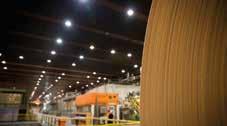
We invest significantly in skills and leadership development, offering talented individuals interesting careers as part of a global group. We are particularly proud of the progress women are making in Mondi South Africa, holding positions such as CFO, Procurement Director, Head of Mondi Zimele and as artisans, foresters, safety managers, nursery manager and in the fields of engineering, finance, human resources and more.
the recently expanded Ligbron E-learning system is now operational in a further three rural schools. Each e-learning classroom has an e-Boxx with a SMART interactive whiteboard, a digital camera, sound system and alarm system. This technology facilitates the weekly live streaming of mathematics and science lessons that are shared by using video conferencing and desktop sharing. During live streaming, the image of the teachers/ learners from linked schools is visible on the SMART board. The SMART boards display the presentation and any student and teacher can write on the SMART board and ask questions from their own school.
Mondi believes strongly that by working in partnerships with government, communities and NGOs we will be able to find sustainable land reform solutions.
We believe that being part of the solution to global challenges will secure the long-term success of our business and the wellbeing of our communities and other stakeholders.
www.mondigroup.com
Community development
Our well-established approach is focused on investing in communities living on our land or near operations. A leading community development initiative is the Mkondo Development Project (Piet Retief), a pioneering public-private partnership focused on improving the living conditions of people in isolated villages on forestry land, and to find sustainable solutions to alleviate poverty and offering security of tenure. The pilot Jabulani Agri-village has been completed and eight other Agri-villages are in progress.
The commitment to education is widespread and
PART OF THE SOLUTION
Viv McMenamin, CEO Mondi South Africa, adds: “Our South African business continues to be a strong contributor to Mondi’s success story. From our sustainably managed forests, to our world-class pulp and containerboard operation in Richards Bay, to being the number one office paper producer in South Africa. We believe in the value of being part of the solution to global and local sustainability challenges and I am proud of the work we are doing in partnership with our communities, government and other key stakeholders. This gives me great confidence in the future of Mondi South Africa!”
